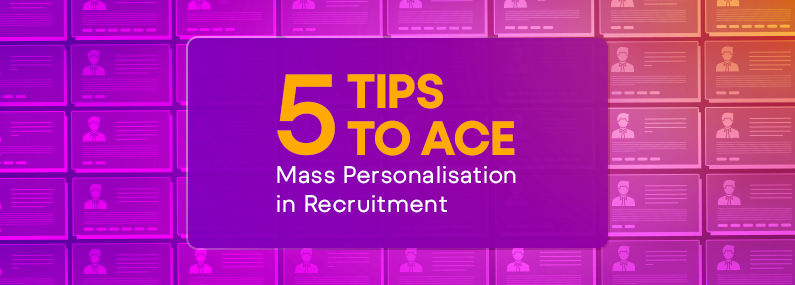Are you seeing the best return on investment (ROI) from your recruitment strategy? At foundit, we’ve found that a mass personalised approach to recruitment is a good formula to achieve results.
Personalised recruitment strategies see better response rates, reduced time-to-hire and are more cost-effective.
But personalisation is also about smart measurement.
If you’re already using a personalised recruitment method, it’s crucial to ask: Are you tracking the right metrics to measure impact? Are you using these insights to refine your strategy for better results?
Here’s how you can ace your personalisation strategy in recruitment.
Starting on Your Journey of Mass Personalisation in Recruitment
If you’re a recruiter, it’s time to switch gears. We’re here to help you build a robust approach to personalisation in recruitment (with key metrics to track) that candidates will actually value. Let’s go!
#Tip 1: Set Clear Goals and Define Success Metrics
The starting block of any successful personalisation strategy is crystal-clear goal setting. What are your priorities when it comes to personalising your recruitment? Is it more engaged candidates, faster hiring times, better-fit placements – or all of them? Define it.
Next, equip yourself with a dashboard of important metrics.
Here’s a snapshot of recruitment metrics that matter:
| Metric | Definition | Personalised Recruitment Insight |
| Open Rates | Proportion of opened emails to the total sent | High open rates may indicate that personal touches in subject lines/content are hitting the mark |
| Response Rates | Frequency at which outreach prompts a reply | Reflects message relevance; personalised messaging tends to boost response levels |
| Hire Rates | Number of hires as a fraction of total candidates engaged | Indicates effectiveness in matching candidate profiles with roles through tailored approaches |
| Time to Close | Average duration to go from job posting to offer acceptance | Shorter times may be a result of more direct and engaging communication tactics |
| Offer Acceptance Rate | Proportion of offers accepted by candidates | Shows whether job opportunities align with candidate expectations |
| Applicant Drop-off Rate | Share of applicants withdrawing mid-process | Reduced drop-off rates suggest a more compelling and relevant application journey |
| Cost Per Hire | Expenses incurred for each successful hire | Reduced mismatches through targeted recruitment can lower hiring costs |
| Retention Rate | The proportion of employees retained over a period, excluding new hires. | Personalised job recommendations reduce the mismatch of expectations between the candidate and the job/company’s work culture |
| Candidate Engagement | Level of candidate interaction with the hiring process | Personalised/tailor-made communication might increase candidate engagement |
| Satisfaction Scores (e.g., NPS) | Measure of candidate or new hire satisfaction | Higher scores show that personalised recruitment efforts are meeting individual needs |
#Tip 2: Collect and Integrate Data Across Touchpoints
As a recruiter, you need to make the data work for you. The first step is to get on a platform that captures candidate information and actionable insights.
Here’s how this integrated data can help: If your candidate is eyeballing tech roles, then you can tailor your job recommendations and messages to reflect their interest.
Show candidates they aren’t just another resume in the stack.
#Tip 3: Segment Candidates for Precise Communication
Imagine being able to pinpoint a ‘start-up star’ who thrives in a high-growth environment or identify a ‘corporate climber’ with a track record in established firms.
For example, sending a custom message that recognises a candidate’s B-School experience will resonate much more than a generic ‘we’re hiring’ email.
It’s about the right message, for the right candidate, at the right time.
#Tip 4: Implement and Monitor Personalisation Campaigns
Define the blueprint of your personalisation strategy: define the channels, craft the messages, segment the audience. For email campaigns, use tools to tailor your subject lines and content based on your audience.
foundit’s latest AI-powered platform for recruiters is equipped with features like Mail Merge and Campaign Sequences to make mass personalisation simple and accessible.
For social outreach, use targeted social ads to reach the right candidates.
After that, set up a dashboard that offers real-time insights into candidate engagement.
Move from spreadsheets to visualised recruitment data that speaks to you instantly.
#Tip 5: Analyse and Refine Your Strategies
Set a rhythm to examine the impact of your personalisation campaign — a fortnightly meeting or review, maybe?
Check if your crafted emails are hitting the mark with open rates, and whether your messaging strategy is on-point with engagement metrics.
Is your time to hire lagging? Reassess your outreach frequency.
Pitch two versions of your candidate emails — a concise teaser against a comprehensive guide. Track which gets more traction.
Refine and amplify your hiring methods by A/B testing your communication.
Key takeaways
Remember, the essence of personalisation is to make candidates feel uniquely valued throughout their journey.
To achieve an efficient mass personalised hiring process, you can start by setting clear goals, integrating data across touchpoints, segmenting candidates, and constantly monitoring and refining your strategies.
When done right, it leads to higher engagement, more efficient hiring, and ultimately, a workforce that is well-matched to your company’s culture and goals.
Related Articles :




